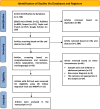Factors Associated with Psychological Well-Being Among Children Under 18 Years Old with Cancer: A Scoping Review
- PMID: 39807478
- PMCID: PMC11727497
- DOI: 10.2147/PRBM.S488905
Factors Associated with Psychological Well-Being Among Children Under 18 Years Old with Cancer: A Scoping Review
Abstract
Background: Cancer diagnosis and treatment can have severe psychological impacts on children that can affect various aspects of their emotional, social and cognitive functioning. Many children with cancer experience long-term psychological distresses. The psychological well-being (PWB) is a critical aspect of their overall health. Understanding the factors that influence their psychological state can help in developing effective interventions to support them.
Purpose: This scoping review aimed to identify and summarize the factors associated with PWB among children with cancer.
Methods: This study applied a scoping review using the guidelines outlined in the PRISMA Extension for Scoping Reviews (PRISMA-ScR). A comprehensive literature search was conducted across multiple databases, including PubMed, CINAHL, Taylor and Francis, and Scopus. Inclusion criteria were included by keywords Psychological well-being OR Psychological AND Children OR Child OR Pediatric OR Childhood AND Adolescent OR Teenagers OR Youth AND Cancer OR Neoplasms OR Tumors OR Malignancy OR Cancer Survivors AND predictor OR factors OR determinant. Studies were included if they investigated psychological well-being in children (aged 0-18 years) with cancer. The Arksey and O'Malley framework for scoping reviews guided the methodology, including study selection, data extraction, and thematic analysis. The quality of the evidence was evaluated using the Joanna Briggs Institute (JBI) and the Mixed Methods Appraisal Tool (MMAT) critical appraisal checklist.
Results: 12 articles met the inclusion criteria and were included in the review. The factors most frequently reported in several categories are age (sociodemographic), psychological function (individual factors), age at diagnosis (health and history), parent attachment and school status (environmental factors).
Conclusion: This review found several aspects that describe the PWB of the articles reviewed. These aspects consist of anxiety, depression, distress, well-being, and self-esteem. From these aspects, many predictors were obtained, which were classified into four categories of factors related to the PWB of children with cancer.
Keywords: cancer; children; psychological well-being.
© 2025 Alya et al.
Conflict of interest statement
The authors had no conflicts of interest in this research.
References
-
- WHO. CureAll Framework: WHO Global Initiative for Childhood Cancer. World Health Organization; 2021.
-
- UNICEF. Convention on the Rights of the Child: The Children’s Version; 2018.
-
- Vaghri Z, Lansdown G. Monitoring State on the Rights of the UN Convention Compliance with the Child. Vol. 12. Human Rights Quarterly; 2022:130.
Publication types
LinkOut - more resources
Full Text Sources
Miscellaneous


